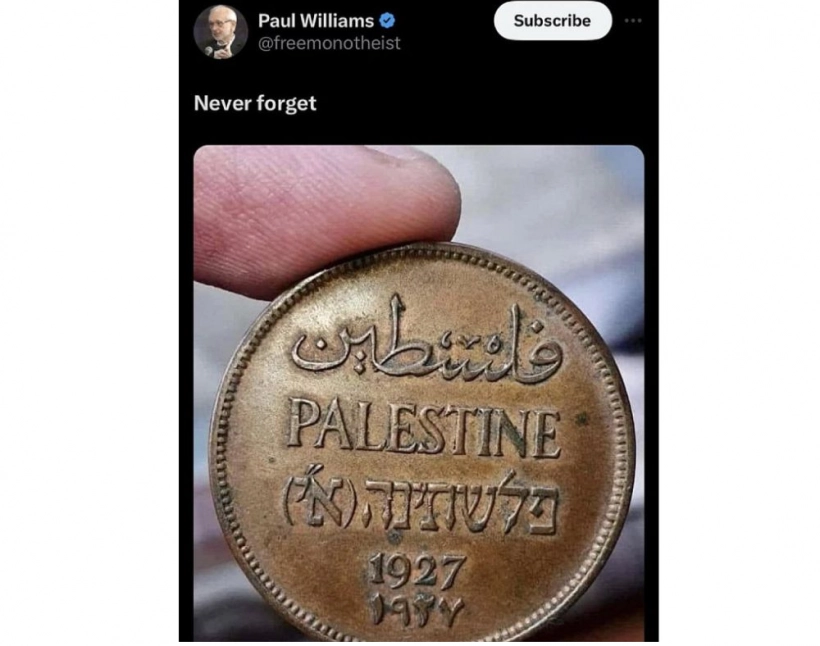
Screenshot from LTV
Māris Antonevičs/Latvijas Avīze
“Never forget”, British theology blogger Paul Williams wrote on X (formerly Twitter), adding a picture of a historic 1927 coin. It reads “Palestine”. The message is clear: the territory where Israel now stands was formerly Palestine, so the Palestinians or Arabs who use the name today have a greater right to it than the Jews.
The proof that this is false is right in front of our eyes – on the same coin below is another inscription, not in English, but in Hebrew – “Land of Israel (Eretz Yisrael)”.
Paul Williams’ YouTube channel is quite popular, with almost half a million followers. He has posted more than a thousand videos there. Paul Williams was a Christian evangelist, but has now turned to Islam. He is quite an influential opinion maker, not only on the internet but also on the podium of London’s legendary Hyde Park Speakers’ Corner. But he is not the only blogger who uses misinterpretations of historical facts to support his point of view. As well as the coin in question (some others have deliberately tried to remove the words “Land of Israel” before posting on social networks), historical maps with the words “Palestine” and other evidence have been published that supposedly confirm some notion of the historical justice for which the Palestinians are fighting.

Screenshot from X
The researcher’s misstatement
In Latvia, the discussion on this topic erupted after the 7 October LTV programme “Rīta Panorāma”, in which Sintija Broka, a researcher at the Latvian Institute of International Affairs, said: “In such a modern analysis of Middle East politics, of course, this conflict began to develop with the establishment of the State of Israel, which took place on the territory of the former State of Palestine.”
After several X users pointed out that this was incorrect and that there was no “State of Palestine” at the time and questioned her competence, Sintija Broka herself apologised for the misunderstanding on X:
“Thanks to my observant followers for pointing out the error I made in my interview on LTV this morning. The use of “State of Palestine” was certainly not historically accurate. I apologise to anyone who was offended by my humane misstatement.”
It is clear that the history of the Middle East is very convoluted and controversial, says historian Iļja Ļenskis, director of the Museum “Jews in Latvia”, admitting that even in Israel there are discussions and disagreements among historians on many issues, but the above-mentioned are “basic questions” that should not be open to interpretation.
Iļja Ļenskis: “Israel was founded in an area that is called differently in different languages. One of the names of the territory is Palestine, which was the name introduced by the Romans in the 2nd century AD. In Hebrew, it was always “Eretz Yisrael”, the Land of Israel, referring to the biblical account of the land being given to Jacob, whose middle name was Israel, and his 12 sons.
The modern State of Israel, like Jordan (originally Transjordan) and Lebanon, was founded in the region historically known as Palestine, but of course this is not about a State of Palestine. Palestine is the name of a territory!”
According to the UN resolution of 29 November 1947, both the State of Israel and the Arab State of Palestine were to be established. When the so-called British Mandate ended, Israel declared independence on 14 May 1948, after which it was immediately involved in a war against several Arab countries at the same time (Egypt, Transjordan, Syria, Iraq, Lebanon and Saudi Arabia), but won. Israel calls it a war of independence, which allowed it to continue building a state, while a State of Palestine was never established. “When Israel won, much of the territory that was intended for the creation of an Arab State of Palestine came under Jordanian and Egyptian control by 1967. Jordan annexed the so-called West Bank. In fact, the first steps towards a State of Palestine were only taken in the 1990s, and that was a very different story,” recalls Iļja Ļenskis, adding that the term “State of Palestine” can still only be used to refer to the future, not the past or the present. At present, we can talk about the Palestinian Authority, but there is no recognised border and no recognised government, even though the Middle East peace process is working towards the creation of such a state.
Even the Bible is useful n blaming Israel
Different historical narratives, which are not always based on facts, are very often used for propaganda purposes, says Middle East researcher Frederiks Ozols:
“It is common to talk about the causes of conflict, but as soon as we get down to the causes, we have to be aware that it is often not the facts that are being talked about, but stories about the facts. There is a huge difference. At the moment, these stories are often framed in a way that everything is against Israel.”
He gives the example of a relatively new story, which is currently being used actively in propaganda by Iran, taken from biblical times: “A specific justification is cultivated for why all this land is exclusively Palestinian and the Jews are the conquerors. Not just in terms of 20th century history, but in ancient times. There were ancient Palestinians who are called Canaanites in the Bible, but the Jews were already massacring them and taking the land from them. And now they continue to do the same. We have to understand that this is not the truth, it is the story of one nation’s relationship with God, and it is not to be confused with historical fact. The Palestinians have no connection with the Canaanites, at least no more than the Jews.”
Iran is very active in propaganda and spreading its messages in English, French, Spanish and other languages. “In the media, they consistently call Israel a “Zionist project” that must surely be destroyed. So they try to befriend the Palestinians, which is a rather strange friendship, because the Palestinians are almost 100% Sunni, while the Iranians are Shia,” says Frederiks Ozols.
“The burden of history”
Historian Iļja Ļenskis believes that people do not always spread misleading interpretations of history deliberately, with a specific purpose, although this cannot be ruled out.
“Deliberate misleading is when a person knows what the truth is and deliberately tells lies. But in many cases involving the situation in the Middle East, people at different levels often do not even think about the basics.
It has somehow entered their minds and it just seems obvious, for example that Israel has supposedly occupied Palestine,” the historian said.
He also concludes that sometimes “history becomes a burden”, which is not only true for the Middle East conflict. “We believe that our history is forcing us to do something, that history was the way it was and we should act accordingly. This can be intertwined with the idea that we have a responsibility before our ancestors and so on. It is often thought that the solution to conflicts is in history, but the solution to conflicts lies in today. We have to resolve this conflict. People who lived 80 or 70 years ago did something, but we must do something today. Arguing that the conflict in the Middle East will continue because that is history is quite foolish,” says Iļja Ļenskis.
